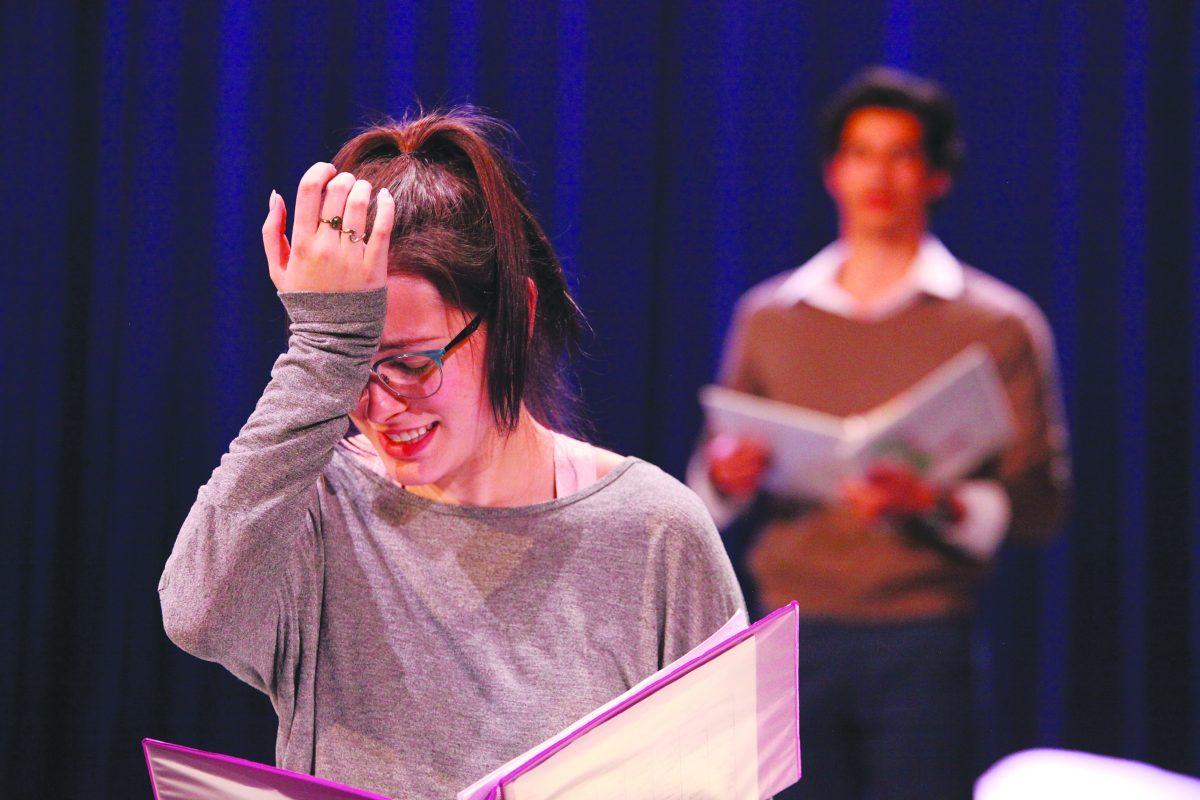
Visual and performing arts junior Alexandra Schmid and marketing junior Carlos Manuel practice a scene in the upcoming play “The Flu Season.” Photo by Pavan Tauh | Mercury Staff.
As the winter weather begins to lift,
the School of Arts and Humanities will be bringing a production of “The Flu
Season” to the UTD stage.
Directed by Thomas Riccio, a
professor of performance and aesthetics, the production consists of a
relatively small six-member cast. Set in a psychiatric hospital — and, in a
fourth-wall breaking style, a theater — the play centers on the plights of the characters Man, Woman, Doctor and Nurse,
overseen by the narrators Prologue and Epilogue. Software engineering freshman
Zach Neiger, who plays the role of Man, said that the play is love story — of
sorts.
“It’s an absurdist piece about sort
of the nature of life and why we’re all here,” Neiger said. “And there’s a
pseudo-love story thrown in there with interesting consequences that you’ll
have to come to the show to see how they turn out.”
“The Flu Season” is a contemporary
play authored by Will Eno, first performed in 2003 and with a runtime of
approximately one hour and 40 minutes. Riccio said he decided on a production
of “The Flu Season” as he was familiar with Eno’s work for some time.
“I met Will Eno years ago,” Riccio
said. “I admired his work, and four years ago, I directed one of his plays
called ‘Tragedy: a tragedy,’ and when I read this, I decided I’d like to do
this one.”
Rehearsals for the play began in
early January, with the cast dedicating about 16 hours per week to on-stage
practice. The play has a heavy emphasis on complex, witty dialogue, which is
often loaded with meaning and self-awareness, said Eric Chauret, a computer
engineering sophomore. Chauret said one of the challenges of portraying his character,
Epilogue, is communicating that meaning to the audience in an intentional way.
“Epilogue and Prologue are the two
narrators of the show, and they’re also kind of two separate aspects of the
playwright himself,” Chauret said. “Epilogue, as opposed to Prologue, has the
hindsight of knowing the entire story of the play before it actually begins
onstage,and takes a much more pessimistic view towards things. He’s very goofy.
He has a bit of a dark sense of humor.”
Neiger said a lot
of Man’s character growth comes from his interactions with Woman and that the
primary conflict for his character comes from trying to figure out his own
psyche and feelings. As for Woman, portrayed by visual and performing arts
junior Alexandra Schmid, the relationship with Man is likewise a key part of
the play.
“The Woman, at the beginning, sort of has this very cold exterior — she’s
not welcoming to people, she’s not very open to anybody, she’s a reluctant
patient at this institution,” Schmid said. “But as her relationship with the
Man tends to blossom, you see a lot of that exterior sort of melt away, and you
see a lot of the deeper emotions, a lot of the deep connections that she makes
with the Man.”
Marketing junior Carlos Manuel, portraying Prologue, said the play is
special not just for the multiple breaks in the fourth wall, but also the
comments it makes about itself.
“Usually a play is, well, ‘trapped’ in the confines of its own story.
This specific play isn’t,” Manuel said. “You’ve got the story within itself,
then you’ve got another story, then you’ve got that story commenting on the
story that is life that is going on around you. And I feel like that’s probably
the most interesting ideology in a play that I’ve ever been a part of.”
“The Flu Season” will have its preview night on Thursday, Feb. 21 at 8
p.m., followed by performances at the same time on Feb. 22, 23, 28 and March 1
and 2, all in the University Theatre. Students, faculty and staff are eligible
for free tickets by presenting their valid Comet Cards at the box office on the
performance night of their choice.